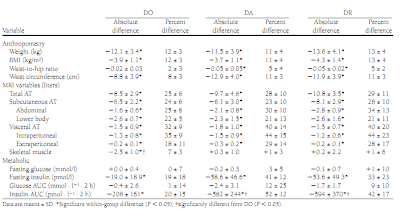Diet, Cardio, Resistance Training & Insulin
Thanks to Mirrorball for "putting a bug in my ear" regarding the impact of exercise on insulin levels. The basic thought being that if Taubes' theory that lowering insulin makes you lose weight, then exercise should be very effective, especially if you couple it with carbohydrate restriction. Because, if you "overeat" protein and fat calories those don't impact body weight right?
So I found this study:
Basically they took three groups of men averaging 40-47 years of age, ~100kg weight, ~32 BMI and did 3 interventions:
Maintenance calories were determined and followed for 2 weeks at the beginning of the study. Then one of the three interventions was applied for 16 weeks. The diet was to create a 1000 cal/day deficit and was a "standard" low fat (<30%) reducing diet. Daily dietary records were kept. At the end of the study, caloric intake was adjusted for 2 weeks maintenance.
The exercise interventions were supervised. The aerobics were mode of choice 5X/week and progressed from just under 20 minutes to one hour max and heart rate from 50% to 85% (monitored). Resistance exercise was 3X/week sessions lasting around a half hour on Nautilis + stretching + sit-ups. They were "coached" to push themselves ;-) You can read the details on reps, etc.
Here were the results: {click to enlarge}
The differences in total weight loss or fat loss did not rise to the level of statistical significance, but I would note that the loss of skeletal muscle in the DO group was statistically different as compared to the slight average gains in both DA & DR. The fat mass lost compared with DO was about 1 kg more in DA and 2 kg more in DR. Nothing mind-blowing but a trend worth mentioning.
In any case, th really mind-blowing results are the insulin! Fasting levels were reduced in all cases, but in DA & DR the reduction was more than 2.5X that of DO. The insulin AUC's (2 hour insulin exposure to 75g OGTT) were also close to 2.5X the reduction seen for DO. Caveat: The initial fasting insulin levels were considerably higher in the DA & DR group so we can't discount this (DO-DA-DR = 97-134-143 pmol/L)
I think the glucose and insulin responses to the OGTT are more compelling in a picture ;-) Diet only changed very little to how these men handled a carb load (solid dot = before, open = after) but quite a bit for DA (especially since their "before" response seems to have already been somewhat better than either the DO or DR men) and still noticeably for DR. This is evidence of huge improvements in insulin sensitivity!
No, carb restriction was not part of the plan here, and it would be nice to see. But in this other study on obese women, we didn't see great differences in fasting insulin with macronutrient alterations:
Edit Tables Below
(I would also note that the fasting insulin levels of these obese women are quite a bit lower overall than those of the obese men in the other study, but us weemen folk are "fatter" than men .....)
Yes, this study demonstrated that exercise didn't seem to impact weight loss much. But folks, when you're obese, 16 weeks isn't going to take you to "normal weight" on any plan. So what one has to look at is what you're dealing with as you go along and in the long run. For the DO group, roughly 20% of the weight loss was lean body mass, while the exercise groups gained LBM on average, albeit slightly. The authors didn't report the calorie levels for the final 2 week maintenance in this study, but in my other study, the exercisers maintained initial TDEE better. In the long run I don't see how this can't offer a weight loss and maintenance advantage over diet alone.
More importantly to me is the insulin sensitivity. It's the key to life and health!!





Comments
It's unfortunate that such a dramatic difference was seen across these methods, but that it can seemingly be so easily discounted by this theory.
If the study continued, do the insulin levels continue to fall at such an accelerated rate, or do they bottom out? Is it dependent on carbohydrate intake? My hypothesis is that exercise would mitigate the insulin level increases associated with a higher level of carb intake, but that simply keeping carb intake low would also keep insulin levels low.
The second study I cited, however, did look at fasting insulin and carbohydrate level. I'm editing in a condensed and a condensed & rearranged form of that table. Looked at this way, in maintenance, exercise seems to lower fasting insulin for LF'ers but raises it during weight loss. The effect appears to be exactly the opposite for the LC'ers. Odd, huh?
These results are in contrast to Kipnis. What to make of that? Dunno.
Relevant!! Finally Ӏ've found something which helped me. Kudos!
My weblog :: garden
Post a Comment
Comment Moderation is ON ... I will NOT be routinely reviewing or publishing comments at this time..